There are many myths surrounding the FIV virus; Find out the Facts, not the Fiction...
Proving that FIV cats are... well, just CATS!
What is FIV?
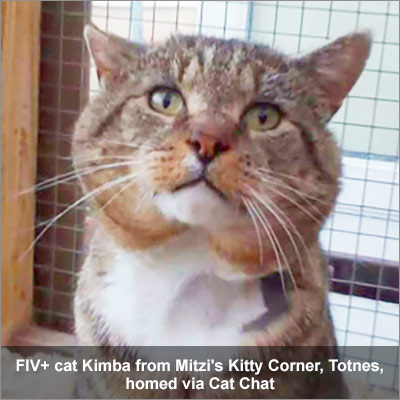 Firstly, FIV (Feline Immunodeficiency Virus) should NOT be confused with FeLV (Feline Leukaemia) - they are two very different viruses. They are often mentioned together due to the 'snap' tests carried out by vets, but they differ greatly in how they affect a cat, and their expected lifespan. FeLV is a serious risk to a cat's health and longevity, whereas FIV is not. To find out about FeLV, visit: Feline Leukaemia (FeLV)
Firstly, FIV (Feline Immunodeficiency Virus) should NOT be confused with FeLV (Feline Leukaemia) - they are two very different viruses. They are often mentioned together due to the 'snap' tests carried out by vets, but they differ greatly in how they affect a cat, and their expected lifespan. FeLV is a serious risk to a cat's health and longevity, whereas FIV is not. To find out about FeLV, visit: Feline Leukaemia (FeLV)
Feline Immunodeficiency Virus (FIV) has been associated with cats for many years, although it was only labelled as such as recently as 1986. The virus depletes the number of white blood cells, which eventually makes the cat less able to fight off infection. However, because it is such a slow acting virus many FIV positive cats can enjoy a normal lifespan with no apparent health problems resulting from the virus. FIV is species specific. It can only be transmitted from cat to cat, not to humans or other animals.
FIV belongs to the same group as Human Immunodeficiency Virus (HIV) and for this reason has received much greater attention than it would otherwise have done. The mere mention of FIV, and the fact that it is sometimes inaccurately known as 'Feline Aids', strikes unnecessary terror into the heart of many cat-owners, so it is worth taking time to consider the facts dispassionately. Firstly, the viral strains used in laboratories on experimental cats were very virulent, and much previously published information is based on this. However, FIV strains in cats living normal lives tend to be much more benign, and may never cause disease.
FIV is species specific. It can only be transmitted from cat to cat, not to humans or other animals.
How does a cat catch the virus?
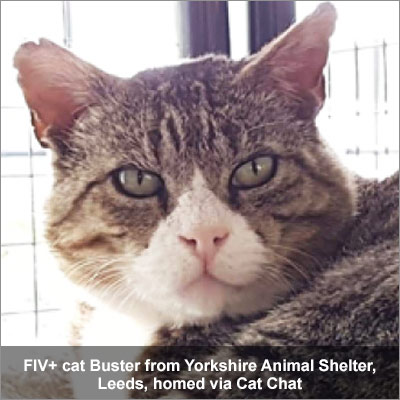 The virus is present in the blood and saliva of infected cats. But, like HIV, it is a very 'fragile' virus, and cannot survive for long outside the body. It also requires a high dose to establish an infection in another cat. Therefore, it is not easily passed from cat to cat. The main route of infection is through biting, when the virus in the saliva of an infected cat is injected directly into the blood stream of the cat it bites. Conversely, a cat which bites an infected cat, is at less risk of being infected, as the virus would not be injected straight into the blood stream, although there is still an element of risk.
The virus is present in the blood and saliva of infected cats. But, like HIV, it is a very 'fragile' virus, and cannot survive for long outside the body. It also requires a high dose to establish an infection in another cat. Therefore, it is not easily passed from cat to cat. The main route of infection is through biting, when the virus in the saliva of an infected cat is injected directly into the blood stream of the cat it bites. Conversely, a cat which bites an infected cat, is at less risk of being infected, as the virus would not be injected straight into the blood stream, although there is still an element of risk.
Cats who fight are most likely to be infected. Cat fights are most likely between entire toms and these are therefore the group most at risk. Since many feral cats are unneutered and have to compete for food, there is a higher incidence of FIV in feral cats. The take-home message is to prevent fighting - make sure your cat is neutered!
Transmission between cats in a group who do not fight is unlikely as the virus can only survive a very brief time outside a cat's body, and it cannot be transmitted indirectly, such as on food, feeding equipment, clothes, shoes, hands etc. (unlike the situation with feline leukaemia). Recent research suggests the likelihood of cats passing on FIV to others in the same household is as low as 1-2%.
It has not been proved that the virus is transmitted sexually, although often the tom cat will hold onto the scruff of the female's neck with his teeth, so if the skin is punctured at that point, transmission is possible.
The take-home message is to prevent fighting - make sure your cat is neutered!
Preventing your cat from becoming infected
The only guaranteed way of preventing your cat becoming infected is to never let it outside, where it might meet other cats. This is a drastic, and unnecessary measure, which crucially may reduce the quality of life for cats who enjoy going outside. It's a bit like never going outside your front door just in case you get run over by a bus, basically the chances are low. The best way of helping to prevent the likelihood of infection is to make sure your cat is neutered. As well as being the most humane way of reducing the future stray population, neutering reduces the tendency to fight, or to wander. » Neutering information & Low Cost Neutering
What are the signs of FIV?
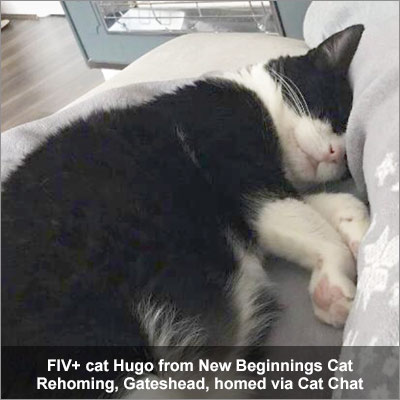 Signs that a cat has become infected can vary greatly, so it is not always apparent until a blood test is carried out. Often, the cat may develop raised lymph nodes around six to eight weeks after being infected, and they may have a high temperature. Sometimes diarrhoea or conjunctivitis may develop, possibly lasting days or even weeks, with the cat then returning to apparent health. Other common signs are gingivitis (gum inflammation), sneezing, snuffling, a discharge from the nose or eyes, or kidney failure. The eyes or brain can be affected in a very small number of cases, resulting in changes in behaviour.
Signs that a cat has become infected can vary greatly, so it is not always apparent until a blood test is carried out. Often, the cat may develop raised lymph nodes around six to eight weeks after being infected, and they may have a high temperature. Sometimes diarrhoea or conjunctivitis may develop, possibly lasting days or even weeks, with the cat then returning to apparent health. Other common signs are gingivitis (gum inflammation), sneezing, snuffling, a discharge from the nose or eyes, or kidney failure. The eyes or brain can be affected in a very small number of cases, resulting in changes in behaviour.
The fact that the virus depletes certain of the white blood cells (T lymphocytes), in theory at least, makes the cat more susceptible to other infections, and it will find it more difficult to shake them off. This is known as 'immunosuppression' and is identical to the situation in HIV infection. However, this is purely theoretical, and in practice many cats do not have any more infections than cats which are not infected with the virus.
The most common infection to occur in FIV positive cats is gingivitis and stomatitis (inflammation of the gums and other parts of the mouth). However, FIV is not the commonest cause of gingivitis. This is common in cats which are fed on an unnatural diet of sloppy canned food. Cats which are carriers of Calici-virus (one of the cat flu viruses) frequently suffer from gingivitis, as well as lot of cats which do not carry either of these viruses.
Whatever the cause, gingivitis is treated initially with a thorough dental scale and polish plus a course of anti-biotics and a steroid drug to suppress the inflammation. Various other chronic infections may also occur - conjunctivitis, diarrhoea, skin and respiratory tract infections (rhinitis or bronchitis). However, these are less common, and again, respond to treatment providing it is carried on for an adequate time.
What is their Life Expectancy?
A cat who contracts FIV will usually still have a strong immune system for several years after infection, it is only over time, that the effects of the virus may start to show, and even then, most infections can be treated with the appropriate medications. With love and good care however, many FIV+ cats can live normal lifespans. These days, it's not unusual to find FIV+ cats reaching 15 years or more. Knowing what we now do of the prolonged nature of the condition, euthanasia is totally inappropriate and inhumane.
A ten-year FIV Monitoring Project was carried out at Glasgow Veterinary School involving 26 cats and the results indicated that a higher percentage of FIV negative cats died during the period of the study than FIV positive cats, and that FIV infection did not affect the cats' life expectancy. Dr Diane D. Addie (Lecturer in Veterinary Virology, University of Glasgow) said "at least 3 studies in FIV positive cats have shown a life span equal to uninfected cats." A fourteen year study by Maureen Hutchison B.Sc, BVMS, MRCVS (veterinary adviser to the Cat Action Trust) found that FIV-positive cats are more likely to die by being killed in road accidents or to be alive and well into their twilight years than they are to die from any FIV related condition.
Knowing what we now do of the prolonged nature of the condition, euthanasia is totally inappropriate and inhumane. Being killed in a road accident is a far higher risk for a cat than FIV
So Why the Unfounded Fears about FIV?
FIV in the stray cat population has certainly fuelled much of the unfounded fear surrounding the virus. It is mainly un-neutered toms, fighting over food, females or territory, who pick up and spread the virus. The stray cat has no-one to look after them, and their lifestyle means they are more likely to pick up other infections, which without treatment can escalate. When one of these gets captured and taken to a vet, suffering from any number of secondary infections, it is often too late.
It is the nature of a vet's work, that they will see many more ill cats than healthy ones, when in fact, there are very many more healthy FIV cats than ill ones - they just don't need to see the vet. Indeed, many pet cats will already be FIV positive, but their owners are unaware of it due to the cat being perfectly healthy!
Testing & Treatment
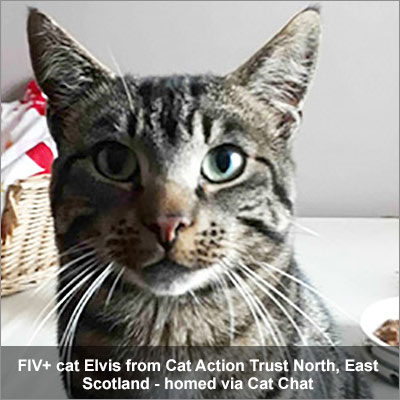 Testing: The FIV test routinely carried out in veterinary practices detects antibodies, which develop four to six weeks after infection, but this test is often unreliable as to whether the cat has the virus. Positive test results obtained by using this simple 'ELISA' test (sometimes called a CITE test, or 'COMBO' test,) should be confirmed by an IFA test (Immuno-Fluorescent Antibody Test) or a Western Blot, as quite often false positives can occur. Some of the ELISA tests are so inaccurate as to make the whole test meaningless, and are producing 'false positives' (due to reacting with a variety of other compounds in the cat's blood). According to the Glasgow Companion Animal Diagnostic Unit web-site (where they give the results of an on-going survey), up to 7% of positive results with the ELISA test are negative when checked by the more accurate IFA test. Many rescues have given up using the ELISA test, and are now using the IFA test only, saving time and money, whilst also being more accurate.
Testing: The FIV test routinely carried out in veterinary practices detects antibodies, which develop four to six weeks after infection, but this test is often unreliable as to whether the cat has the virus. Positive test results obtained by using this simple 'ELISA' test (sometimes called a CITE test, or 'COMBO' test,) should be confirmed by an IFA test (Immuno-Fluorescent Antibody Test) or a Western Blot, as quite often false positives can occur. Some of the ELISA tests are so inaccurate as to make the whole test meaningless, and are producing 'false positives' (due to reacting with a variety of other compounds in the cat's blood). According to the Glasgow Companion Animal Diagnostic Unit web-site (where they give the results of an on-going survey), up to 7% of positive results with the ELISA test are negative when checked by the more accurate IFA test. Many rescues have given up using the ELISA test, and are now using the IFA test only, saving time and money, whilst also being more accurate.
The IFA test is not expensive, and will give you a definitive answer in under a week. To obtain this ask your vet to send a blood sample to a testing lab. Details of Testing Labs at the bottom of this page. Very rarely, false negative results can occur if the test is done too early for antibodies to have developed, or simply because of the innacuracy of the ELISA test. Again the IFA test will confirm with far more accuracy.
Testing Labs:
SYNLAB - Veterinary Pathology Group (VPG): www.vet.synlab.co.uk
University of Glasgow, Veterinary Diagnostics Services: www.gla.ac.uk/schools/vet/cad/
University of Bristol, Langford Veterinary Services: www.langfordvets.co.uk/diagnostics
Idexx Laboratories: www.idexx.co.uk/diagnostics
Treatment: Treatment consists of dealing with whatever symptoms occur in the individual cat, such as common infections being treated with Antibiotics. If an FIV positive cat displays any symptoms of illness, however minor, it should be taken to a vet promptly. Once established in a cat's cells, the virus is permanent, and no proven vaccine* has yet been found.
*A vaccine was developed in the USA in 2002, but it's reliability has not been determined, and it is not available in the UK. A big disadvantage with the vaccine is that once a cat has been vaccinated, they will automatically test positive on an FIV test even though they don't have the virus.
Adopting an FIV positive cat
A healthy FIV positive cat can live for many years, and indeed can often outlive non-infected cats, but please be aware that this is not always the case. Due to their impaired immune system, the cat may succumb to illness earlier, and not reach their normal life expectancy. FIV cats will need prompt veterinary assistance for even minor symptoms. With good care, many FIV+ cats can live normal lifespans. These days, it's not unusual to find FIV+ cats reaching 15 years or more.
One american study showed that FIV+ cats are far more likely to lose their lives through being euthanised, because no-one was willing / able to adopt them, than from any effects of the virus.
Cat Chat is keen to promote the adoption of healthy FIV positive cats. It is very encouraging that an increasing number of veterinarians in the UK are realising that healthy FIV positive cats can enjoy a good quality of life, and that euthanasia is both inappropriate and inhumane. Any tom cat found to be FIV positive should be neutered, and fighters managed in such a way that they do not have the necessity or opportunity to fight. Neutering them may be all that is required. It is surprising how many aggressive stray tom cats turn into docile pets when they have been castrated and no longer have to fight for every mouthful of food!
Thankfully, as scientific facts have slowly dispelled the myths surrounding FIV, more people are willing to adopt an FIV+ cat into their home. That said, FIV positive cats still find it harder than most to find new homes, even though in all other respects they are normal, loving cats, and deserve a chance at a happy life. Additionally, as stress can further lower the immune system, the FIV positive cat's need to leave a rescue environment and instead live in a stable, loving home is even greater. If you think you might be able to give a home to an FIV cat, ask at your local rescue centre » Cat Rescue & Adoption Centres and Rehoming Groups across the UK & Ireland.
Can FIV-positives and FIV-negatives live together?
 Research carried out at Glasgow University's Companion Animal Diagnostics indicates that the chances of FIV being passed from one cat to another in the same household is approx 1-2%. This means that if you have 100 cats (!) in a house with 1 FIV positive cat, only 1 or 2 could be expected to become infected. Even when FIV was passed on, as in the Glasgow survey, none of the cats actually died of it. In another survey a few years ago FIV was not passed from cat to cat in the same household at all.
Research carried out at Glasgow University's Companion Animal Diagnostics indicates that the chances of FIV being passed from one cat to another in the same household is approx 1-2%. This means that if you have 100 cats (!) in a house with 1 FIV positive cat, only 1 or 2 could be expected to become infected. Even when FIV was passed on, as in the Glasgow survey, none of the cats actually died of it. In another survey a few years ago FIV was not passed from cat to cat in the same household at all.
The Celia Hammond Animal Trust have been conducting a long-term study at their sanctuary since the late 1990's, where FIV-positive and FIV-negative cats live happily together, grooming each other and sharing food bowls and litter trays. Regular blood tests for the virus are carried out, and to date no cases of transmission have yet been found. Cats are far more at risk of being bitten by an unknown feral or stray FIV positive cat than by a friendly, neutered, FIV positive cat living as part of the family.
With the aim of keeping all cats healthy and to minimise all risks, one important consideration is that the FIV positive cat, having a suppressed immune system, may be at greater risk from catching an illness from the other cats in the household. Therefore, it is crucial to keep all cats' vaccinations up to date, and to keep FIV cats away from any sick cats in the home.
Given what is now known, there seems no reason not to have FIV positive and negative cats in the same household, provided all cats are neutered, up to date with their vaccinations, and that they are not fighters. If two cats in one household fight, they should be kept apart, given behavioural therapy or one re-homed, regardless of their FIV status.
Some rescue organisations prefer to place FIV+ cats into homes as the only cat. One benefit of this, is that it avoids the potential of raised stress levels which can occur when introducing a new cat to another. However, if both cats are reasonably sociable, this may not be a concern. Indeed, the cat may be far happier coming into in a loving home with another friendly cat, than staying in a rescue environment.
In conclusion, this is a decision to be taken on a case by case basis, depending on the natures of the cats involved.
Cats are far more at risk of being bitten by an unknown feral or stray FIV positive cat than by a friendly, neutered, FIV positive cat living as part of the family.
Should FIV+ cats be allowed outside?
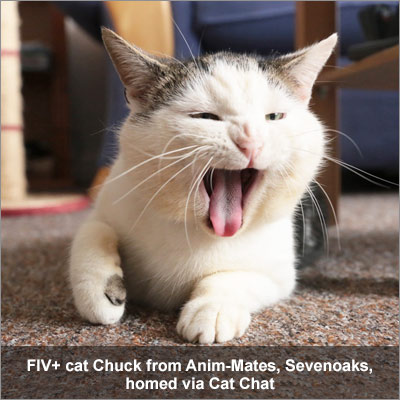 Some rescue shelters insist that FIV+ cats are homed as 'indoor cats' or go to homes with an enclosed garden to prevent contact with other cats. Certainly if the cat has aggressive tendencies it should not be allowed free access to the outside world, or to mix with non-infected cats. However, being indoor-only may be considered as reducing their quality of life, since most FIV positive cats have previously been used to going outdoors. In some cases being confined indoors can even cause stress, which may further lower their immune system. However, given the length of time some FIV+ cats remain in rescues before being adopted, an indoor home is far better than staying in rescue, and will also limit their exposure to outside infections. An enclosed garden can be a good compromise. If your FIV+ cat is going to remain inside, you may find our 'Keeping Your Cat Entertained Indoors' blog useful.
Some rescue shelters insist that FIV+ cats are homed as 'indoor cats' or go to homes with an enclosed garden to prevent contact with other cats. Certainly if the cat has aggressive tendencies it should not be allowed free access to the outside world, or to mix with non-infected cats. However, being indoor-only may be considered as reducing their quality of life, since most FIV positive cats have previously been used to going outdoors. In some cases being confined indoors can even cause stress, which may further lower their immune system. However, given the length of time some FIV+ cats remain in rescues before being adopted, an indoor home is far better than staying in rescue, and will also limit their exposure to outside infections. An enclosed garden can be a good compromise. If your FIV+ cat is going to remain inside, you may find our 'Keeping Your Cat Entertained Indoors' blog useful.
If an un-neutered cat is found to be FIV positive, they absolutely MUST be neutered before being allowed back outside. Indeed, a responsible owner should always ensure that their cat, regardless of their FIV status, is neutered or spayed before being allowed access to the outdoors.
In cities and urban areas where there are a high numbers of stray and un-neutered male cats, there is little benefit in confining a neutered, cared-for, FIV positive cat indoors when a large percentage of cats outdoors will already carry the virus. However, in rural areas and where there are low rates of FIV infection, the decision on whether to allow an FIV+ cat access to the outdoors needs to be taken with a view to preventing the spread of FIV locally.
The decision then, should be taken both with regard to the individual cat's nature and needs, and also as to whether the virus is already present in the general cat population in the area.
Caring for your FIV+ cat
Good care and lots of love can help your FIV+ cat to enjoy a long life. Love is a powerful immune system enhancer - so cherish your FIV+ cat! Whilst healthy, their regular annual vaccinations should be kept up to date, but do check with your vet about vaccinating if the cat is suffering symptoms. A good diet will help, including vitamin supplements such as buffered vitamin C (sodium ascorbate) and vitamin E, which builds immune system strength.
At any sign of illness, take your cat to the vet, as early treatment can prevent many problems. Antibiotics can control infections, and FIV+ cats who reach a chronic stage may rely on antibiotics more frequently. As with all cats, FIV+ cats should have a routine veterinary check-up every year, even when they are apparently healthy.
Love is a Powerful Immune System Enhancer - so Cherish your FIV+ Cat!
Boarding your FIV cat
Boarding catteries should have no problem accepting an FIV cat, since the virus cannot be transmitted by feeding equipment etc. although you should make them aware of the cat's condition. The cattery will need to know this, to ensure that they are not allowed contact with other cats, and also so that they can keep a close eye for any symptoms of illness, and act promptly.
Insuring your FIV cat
Most pet insurance companies should agree to insure an FIV positive cat, however they may add extra 'exclusions' in the policy for anything they might consider to be FIV related. Ask around different insurance companies, to compare what they will cover. Even with exclusions, we still recommend taking out insurance for your FIV cat. A good back-up plan is to set up a direct debit into a savings account, to build up extra funds in case something crops up that your insurance policy doesn't cover.
Kittens
FIV positive cats should always be neutered, however if a female FIV positive cat is allowed to become pregnant it is extremely rare for the kittens to become infected with the virus. FIV differs from feline leukaemia in that respect, in that it is not passed on from the queen to kittens in utero. However, kittens born to an infected mother will absorb antibodies from her milk and will therefore give a positive response to the FIV antibody test. These kittens will then test negative after 12-16 weeks, as their maternal immunity wanes. It is therefore pointless to test kittens under 16 weeks using an FIV antibody test.
Even though it is rare for kittens to be born FIV positive, if there is a clinical need to find out their FIV status, the University of Bristol, Langford Veterinary Diagnostics can carry out an antigen test, which detects the presence of the viral DNA itself rather than just the antibody. This is a relatively expensive test, but if needed, information can be obtained from them by Email: This email address is being protected from spambots. You need JavaScript enabled to view it.
Further information & advice
Catwork Sanctuary - Introduction to FIV: www.fivcats.com/FIV/fiv_introduction.html
Catwork Sanctuary - Should FIVs be 'indoor-only'?: fivcats.com/FIV/fiv_indoor_only
'80 FIV Cats' - Catwork Sanctuary's booklet about FIV: fivcats.com/FIV/80_fiv_cats_booklet
Could you Adopt an FIV+ cat? Ask at your local Rehoming Centre: Cat Rescue & Adoption Centres, UK & Ireland
Help Prevent the Spread of FIV - Please Neuter Your Cat!
1,000 FIV CATS PROJECT: an ongoing project by Catwork Sanctuary. If you, or someone you know, owns or has owned, an FIV cat, you can contribute to this project, and help to give more FIV cats the chance of a happy life: Due to the misconceptions about this virus, FIV positive cats in shelters find it harder to find new homes, even though in all other respects they are just normal cats. Many rescue centres will pay for any future FIV related veterinary treatment even after rehoming. If you think you might be able to give a home to an FIV cat, ask at your local rescue centre here: » UK Rescue Centres
Due to the misconceptions about this virus, FIV positive cats in shelters find it harder to find new homes, even though in all other respects they are just normal cats. Many rescue centres will pay for any future FIV related veterinary treatment even after rehoming. If you think you might be able to give a home to an FIV cat, ask at your local rescue centre here: » UK Rescue Centres
Thanks to: Maureen Hutchison BSc, BVMS, MRCVS • Diane Addie Ph.D of the Council of Cats Protection • Celia Hammond Animal Trust • Catwork Sanctuary, Somerset, for advice and information when compiling this page.
Cats Protection produce leaflets on many feline medical conditions: see their website » www.cats.org.uk



